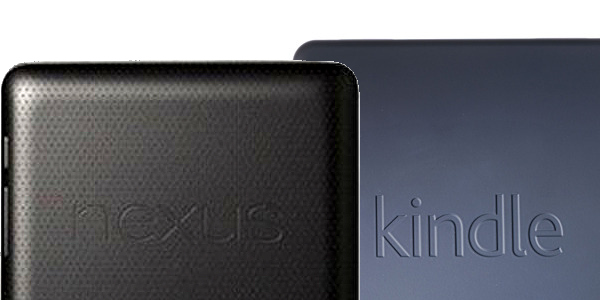
Tough luck, iPad, Android owners read tablet publications more often
More Americans are discovering what I did, after buying the original iPad more than two years ago: Reading ebooks, magazines and newspapers on a tablet is an immersive experience and often much more satisfying than print. Today, comScore says that in August, two out of every five US tablet owners read a newspaper or magazine and one in 10 did so almost every day.
The numbers' meaning is greater when taken in context of another. Pew says that during the same month, one in four Americans used a tablet (22 percent as owners, 3 percent borrowing one belonging to another household member). Make no mistake, magazines and newspapers are going digital in ways like nothing seen on the Internet, because of publishers' ability to deliver richer content -- at that, more frequently -- and actually make money doing so.
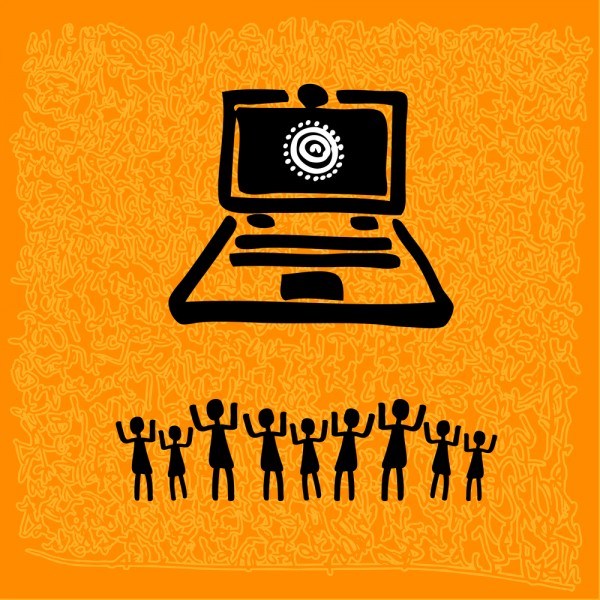
Tech tribalism leads to BAD computing decisions
Computing, and I use the term in the widest sense, has always been tribal to an extent. People have loyalties, and there’s nothing wrong with that. This year, tribes are called "ecosystems", but whatever the current label, looking around the Interweb it seems to me that tribalism is becoming more prevalent and more aggressive. It’s as if everyone stood on soapboxes with their fingers in their ears, shouting "LALALALALALALA", while at the same time (a good trick, this) yelling through a megaphone that theirs is the only way and anyone who doesn’t agree is just too stupid to be considered human.
Famously, way back in 1994, the writer and thinker Umberto Eco (The Name of the Rose) compared computing loyalties to religions: Apple followers were Catholics who believed that they would find salvation through following the One True Path. Conversely, PC users, like Protestants, were obliged to find their own way through the many paths open to them, and not all would be saved. And (I guess) Linux users are the hairy prophets who come out of the desert proclaiming, "It’s really easy. Honestly. And these days you only have to scourge yourself with thorns once a week …"

Microsoft announces Xbox Music
Whether you think Microsoft wants to be Apple, or not, the company continues to roll out products designed to compete with its major rival. Today’s announcement is for Xbox Music, a digital music service for the Xbox games console, which will also appear as the default music player in Windows 8.
The service, which goes live tomorrow and will be available in 22 countries from launch, is a cross between Spotify and iTunes. Users will be able to listen to songs or full albums for free, create artist-based streaming radio stations, and put together music mixes and playlists. The iTunes element comes in the form of a music store, which will allow users to purchase and download tracks. The store will reportedly offer over 30 million songs, some four million more than Apple's store. There will also be over 70,000 music videos on offer.

Google Cultural Institute delivers history lessons through technology
History is often overlooked and rarely highlighted in technology, of lesser importance if you will. Google decided to put history in the foreground with the introduction of the Google Cultural Institute by using technology as a foundation.
Seventeen partners, including cultural foundations and museums, contribute to the project through their archives of letters, first-hand video testimonials and manuscripts, as well as other resources. The Google Cultural Institute offers 42 new historical exhibitions that are available for online viewing and includes stories detailing significant events of the 20th century. The Holocaust, D-Day and the Apartheid are all major turning points in human history, and highlighted in a digital form by the Mountain View, Calif.-based corporation.

Get 21GB of space on MegaCloud for free [BetaNews Exclusive Offer]
MegaCloud is a new, free-to-use cloud storage and backup service (compatible with Windows, Mac, Linux, and Mobile) that lets you store, sync and share all your documents, photos, music, videos and more across all of your devices. Unlike some similar services, having a free account doesn’t mean being restricted in any way -- all free users get 16GB of space, divided into 8GB for storage and 8GB for backups.
Well, that’s how much ordinary, everyday free users get. But obviously, as a BetaNews reader you deserve a little extra, so MegaCloud has kindly upped the free storage on offer to 21GB (13GB for storage, plus 8GB for backups) exclusively for us, and all you need to do is click on the link below and sign up for a free account. And if that’s still not enough free space for you, you can get yet more gratis storage simply by installing a mobile app or referring friends to the service.
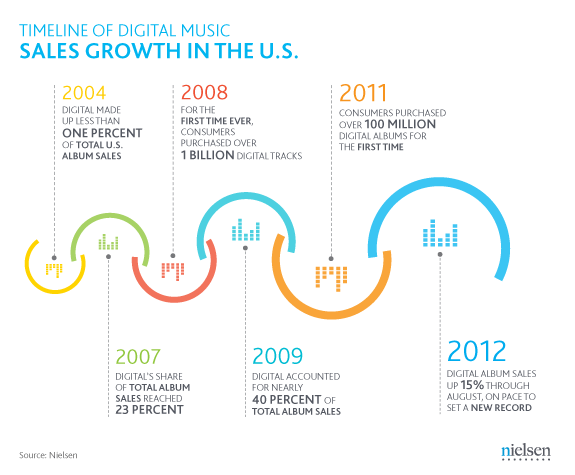
Digital music sales set to break record
This week one of my colleagues posted to group chat: "The CD player turns 30". To which I asked: "What's a CD?" And someone else took the question seriously: "Compact Disc". Duh, I know that. But does anyone younger than 10? It's a serious question given a prediction Nielsen makes.
The analyst firm expects record-breaking digital music tracks sales in 2012 -- that means in excess of last year's 1.3 billion. The number already exceeds 1 billion, and Nielsen forecasts digital album sales will grow 15 percent year over year. My, how times have changed.

Facebook reaches 1 billion monthly active users
You know what’s cooler than 500 million Facebook users? One billion. That’s the number of people Facebook says are now using the social network every month. It reached that magical milestone on September 14 at 12:45 PM Pacific time, so it’s probably one billion and a bit, by now.
To celebrate, Mark Zuckerberg posted a little thank you and a fact sheet about the news, which contains some interesting key metrics, including that there have so far been 140.3 billion friend connections, and over 1.13 trillion likes since that feature launched in February 2009. There are 219 billion photos currently on the site, not including deleted ones, which Facebook says totals around 46 billion.

Skype offers free WiFi across the UK
If you live in the United Kingdom or the Republic of Ireland, you’ll soon be able to access free WiFi through cafés, restaurants, hotels and shops, courtesy of Skype and wireless provider Wicoms.
The new WiFi network initiative, called Free Skype WiFi, will be available to all Skype users and accessed using the free Skype WiFi app. This already allows users to connect to over a million hotspots around the world, but for a fee. Users who don’t currently have a Skype account will be able to sign up on the spot by entering their email address.

Cloud's a highway, but I hit some speed bumps on the post-PC road
Call me a pioneer. Those who have followed my contributions of late will have noted that I'm somewhat of a post-PC fanatic. I've taken it upon myself to blaze a trail into an IT future that features virtually no Microsoft or Intel technologies. Along the way, I've managed to stitch together a fairly functional post-PC solution. However, my journey has not always been a smooth one, and I will forever carry the scars of slings and arrows gone by.
For example, as I write this I'm sitting in the nearly empty family room of the new waterfront condo my wife and I just bought near Manalapan, FL. And as is often the case with a new property, I have yet to set-up any sort of Internet access -- nor do I plan to do so since we'll only be staying in the property for a few days before returning to Mauritius.
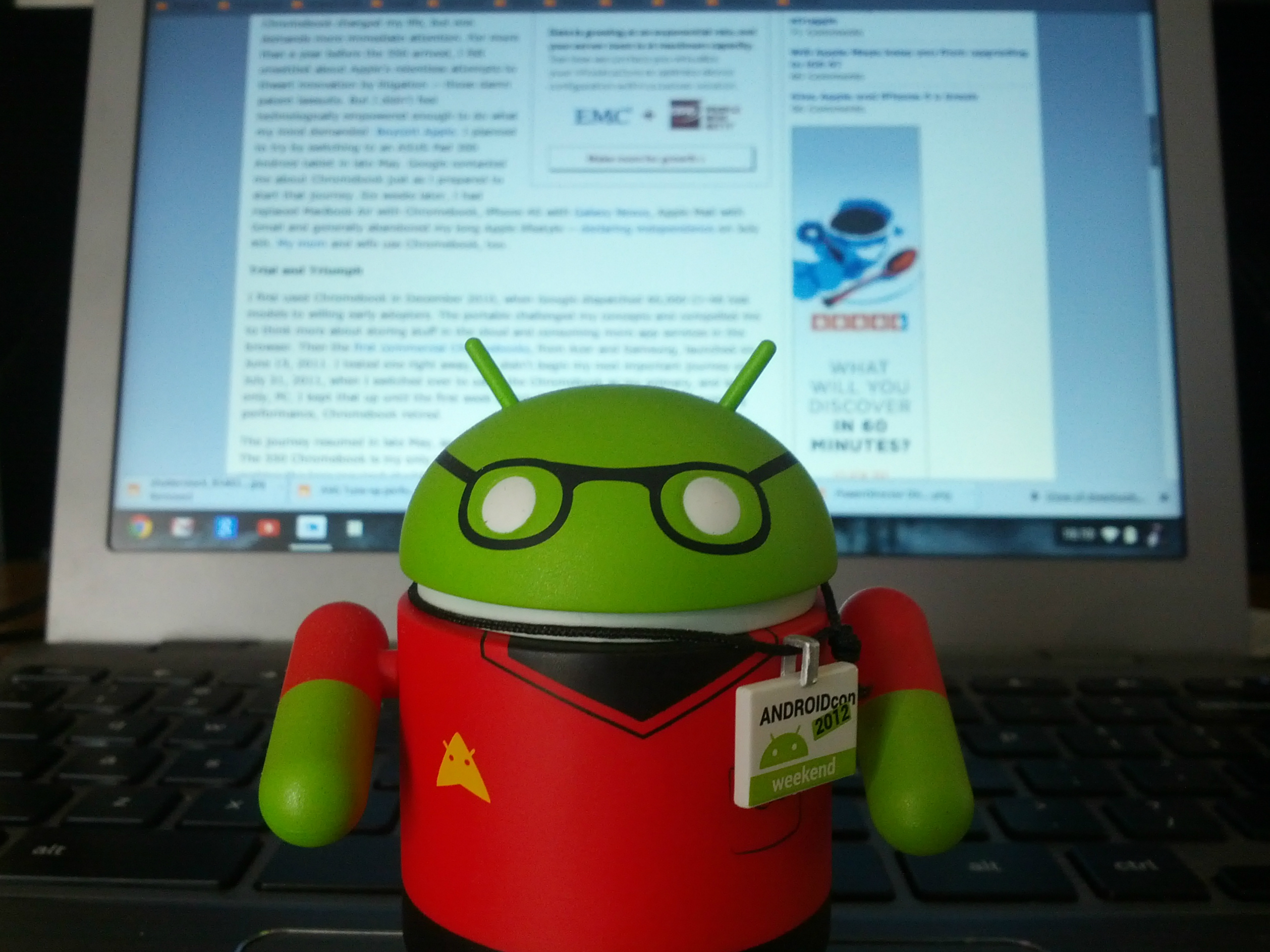
Chromebook changed my life
Four months ago, I put aside (and later sold) MacBook Air for the Samsung Series 5 550 second-generation Chromebook and never looked back. They say three times is a charm, and that proves true with my third foray using a laptop running Chrome OS. The first two proved life-changing, as I adopted a partial cloud computing lifestyle. Now I live a vigorous, charmed cloud life, which includes Android embrace.
Chromebook isn't easy, because it demands a thinking reset. I had to put aside concepts about everyday computing, fear of losing Internet connection and perceptions about hardware configurations and what's good enough performance value. Something else: When I started this journey, in December 2010, Chrome OS wasn't good enough, because there weren't enough supporting cloud apps. That has changed dramatically, because of Chrome Web Store and how much desktop-like utility Google now brings to cloud services like G+ or YouTube.

So long robot, I'm ditching Android
Dear Google, that's it! I've had enough! Enough of the random lockups and reboots. Enough of the buggy browser and convoluted multitasking. Enough of Android!
Google, I've given you a fair shot. I drank the Kool-Aid. I joined the Android Army. And I wore my green robot tattoo thingy with pride. However, I could never shake the feeling that I've been running with the wrong crowd.

Microsoft enters the Windows 'RT era'
I'm having one of those "duh" moments this afternoon, actually it started in the AM. Gartner analysts today profess the obvious: Windows 8 is a gamble, but one Microsoft must make to stay relevant. Really? Like we haven't said similarly here at BetaNews, and others elsewhere, for months. Given, the only good news today seems to be iPhone 5, and we're all so tired here of promoting Apple's Jesus Phone (could the Second Coming really get this much press), anything Windows 8 is welcome.
Something more: Gartner analysts finally go on record clearly stating that the post-PC era -- what I call the cloud-connected device era -- is here; not coming someday, but upon us now. Well, the transition phase anyway. That's worth putting on record for your reference and our future stories.

When will multi-platform users escape digital content hell?
I'm not locked in to any one company's ecosystem right now. I have a Windows 7 Ultrabook, a desktop I built myself running Mint Linux, an iPad, and my trusty Galaxy Nexus. Each appliance serves the purpose I purchased it for very well, and I feel no need to switch away from any of them for the moment. When I perform basic daily tasks, things run smoothly. I use Dropbox and Google Drive for sharing much of my content back and forth, and it's a great experience.
When it comes to purchasing digital content like music, movies, or books, it feels like I am punished for not being locked in to any one content system.
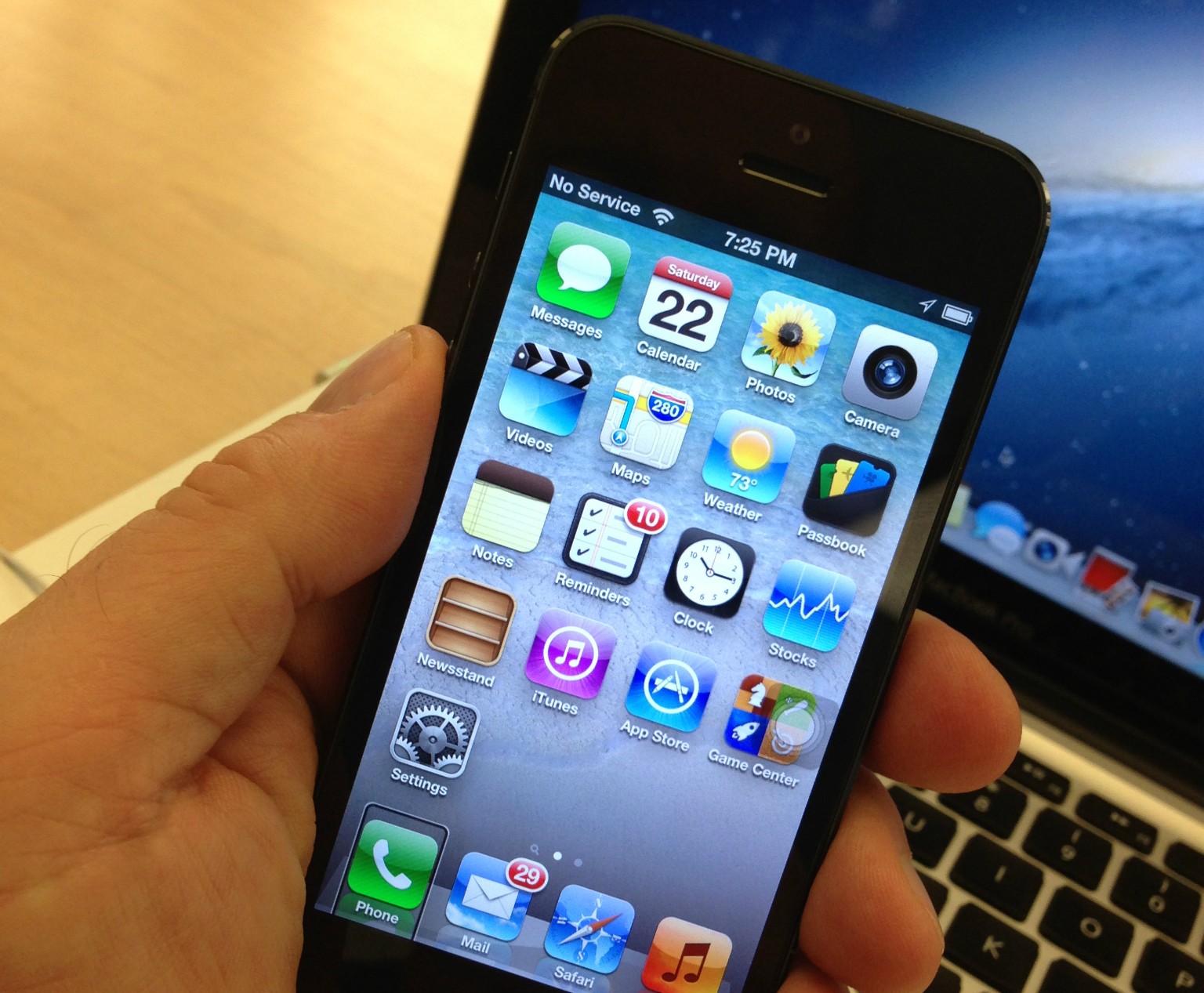
Give Apple and iPhone 5 a break
iPhone 5 is not a revolutionary device. Does it really need to be? No. Despite the geek freak-out that iPhone 5 isn't innovative enough, I don't doubt the handset will sell really well. What matters: Is it better enough? From my first impression, playing with one inside Apple Store, yes. More importantly, the device will be better enough for many people moving from feature phones to smartphones but shocked by the huge physical size of other devices.
Apple already has a successful post-PC product and supporting ecosystem of applications, cases, peripherals and other stuff. iPhone 5 isn't the be-all, end-all Apple cloud-connected device but the flagship in a platform continuum. Why else, for example, would the company also offer iPhone 4 (free) and iPhone 4S ($99)? iPhone 5's challenge is to be better enough, and if it's not for some buyers -- say, either the 4 or 4S is good enough -- older models are still available for less. To understand what iPhone 5 is not, you need to understand what Apple is and why the new handset actually is more than upgrade enough.

You're living in post-PC denial
Talk about your bitter clingers! Here I am, minding my own business, just writing about my experiences using an Android tablet, when out of the woodwork comes this wave of angry post-PC deniers. I mean, the level of rage on display is unreal. You'd think I walked into a Steve Jobs memorial service wearing an "I love Android" t-shirt or something!
For those of you who missed my earlier post, I noted how pleased I was with the outcome of my own post-PC experiment. I wrote how, with the right supporting peripherals, I could be perfectly productive on even a cheap Android tablet -- like my trusty Acer Iconia Tab 200. In fact, I was so impressed with the results that I declared being done with laptops forever. I would literally never buy another traditional laptop PC.
